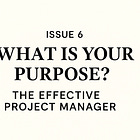Spotlight #1: Grace Grossmann
3 Subtle Shifts to Become More Disciplined When Dealing with Mental Health Issues
Hello everyone,
If you’ve been following for a while, you were probably expecting a new issue of What Is Your Purpose?
Unfortunately, due to circumstances outside my control, this week’s edition couldn’t be released. I won’t pretend I’m not disappointed — I love sharing those stories — but the rhythm must hold.
The good news is that this gave me the perfect opening to launch something I’ve been meaning to do for a while: a new series that explores discipline through a different lens.
Some of the people who inspire me most don’t write about discipline directly. But they write about things that overlap with it: grief, attention, healing, focus, resistance, meaning, amongst others. I wanted a space to pass them the mic. To invite them into this conversation in their own way.
That’s what Spotlight is for.
This new series will run quarterly. Each edition will feature someone whose work intersects with discipline from an unexpected angle. Someone who helps us see the bigger picture.
What Is Your Purpose? will continue on its usual biweekly cadence. It’s not going anywhere. But Spotlight lets us stretch the edges of the conversation.
Now. Let me tell you about today’s guest.
Grace Grossmann was the first person I ever collaborated with as a writer. Her publication, Mindful Moments, gave me an early sense of what it felt like to share space and purpose with another voice.
She’s a writer, spiritual thinker, holistic healer, yoga teacher, and kindergarten teacher. But more than that, she’s someone who embodies what it means to rebuild.
At 21, Grace lost her best friend to mental health struggles. That loss changed everything and set her on a path of healing that has shaped her life and work ever since.
It’s precisely because of her lived connection with mental health that I invited her to reflect on how discipline fits into the healing process. What happens when discipline stops being rigid and starts becoming rhythmic? What if it’s not something to force but something to dance with?
Grace’s story offers a deeply personal take on how structure, creativity, and self-kindness helped her rebuild momentum, and how discipline, in its gentlest form, became a key part of her healing.
What follows is Grace’s reflection, in her words, unedited. I chose to preserve the original format entirely. This story deserves to be heard as she told it.
Here we go.
How to dance with discipline and revive your sense of self—one gentle step at a time
Only two years before starting my 3-year degree to become a kindergarten teacher in Germany (which I just finished, woohoo!), I was admitted to a mental health clinic.
These studies revived my self-confidence and, most importantly, gave me structure and discipline again – something I was missing and found tough when suffering from depression that despised me, even getting out of bed.
I know what it is like to feel numb and not want to carry on. However, I now notice something powerful: discipline is/can be a cure for depression.
When depressed, we cannot face another day, let alone another task on our to-do list. Hence, why the word “discipline” sounds too rigid, so let’s reframe it:
These 3 subtle shifts to become more disciplined when dealing with mental health issues are a part of a dance.
When we dance with discipline, we enjoy it!
1. Don’t see discipline as a distant chore, but rather at your core
As humans, we thrive on routine.
I can’t say this enough as a mental health advocate and holistic healer—many clients come to me saying, “I’m stuck” or “I can’t do this.”
Then we look at their routine. Outside the normal 9-5, they’re doing the usual: food shopping, gym, cooking, and Netflix.
But where are the routines that make your soul light up?
I like to call these rituals—the things we do for ourselves.
What about 5 minutes to breathe consciously and sit in silence instead of scrolling for an hour and wasting your time?
THAT, my friends, is WHY we struggle with feeling like sh*t and not knowing how to be disciplined.
Social media has robbed us of our ability to notice time, but made us experts at wasting it.
Remember this: we are most driven and delighted when we’re disciplined in mindful momentum that makes us feel alive. That means: get creative!
2. Creativity is at your core: your lost art to healing
The more I am on Substack, the more I see that writing is within us all.
It calls us inward to express the deep, dark secrets we felt we couldn’t share due to societal standards or shame that held us back.
I’ve been a writer for as long as I can remember—diaries, journals, always dreaming of being an author.
Now, I am one. I made that dream come true.
How?
I listened to my heart.
I never followed the crowd. I dressed differently as a teen and had a flip pink phone in school while everyone else had Blackberries (felt like I was in Lizzie McGuire, ngl).
Why am I telling you this? Because creativity helped me embrace my authenticity.
When you create, you become more disciplined.
You help your mental health by tapping into your soul’s drive to feel alive and thrive.
3. Do what makes you feel alive
Mental health and discipline both demand your full attention.
When I was depressed, all I could focus on was the mess I was in, the guilt, the shame, the heaviness.
But when I invited discipline, I managed my time—and my energy—much better.
Studying child psychology, sociology, and education over the past 3 years has fascinated me.
I studied almost every weekend, and I trained myself to enjoy it.
Pro-Tip: Enjoyment helps the process. Learning is a privilege!
What I relearned about myself was that I thrive off discipline, and it was one of the main things missing in my life when depression took hold.
The takeaway:
Without discipline, we feel we aren’t in control of our lives.
With mental health issues, we also feel we aren’t in control.
But here’s the truth:
Discipline enhances our mental health to a balanced state.
Mental health issues diminish our desire for discipline.
They are deeply connected. For me, discipline has been a key part of my holistic healing over the past four years.
When we master our mind, we naturally want to master our time, our energy, and our efforts.
That’s how discipline keeps us in check—not just with routines, but with self-care rituals that delight us.
So, are you ready to dance with discipline and invite it in?
It starts small. 10 minutes in the morning to prepare your breakfast and eat in silence.
No phone. Just presence.
You’ll notice how discipline kicks in and calms your day, free from the cortisol rush.
Mindfulness is a big key to being free.
Follow me. Let’s take it one mindful moment at a time.
In Mindful Moments, we focus on monthly mottos to get you back to your natural state of courage, calm, and confidence, one step and prompt at a time.
Thank you, Grace, for letting us see the world through your eyes.
There’s a line in her piece that stayed with me:
“Mental health issues diminish our desire for discipline.”
It hit hard. And not just because it’s true, but because I’ve been circling around a similar insight while working on a few upcoming projects. Grace just said it plainly.
When your mental health slips, your executive function takes the hit. That’s your internal control panel. The thing that helps you focus, shift, act, and remember what matters. When it’s working, discipline feels like rhythm. When it’s not, even brushing your teeth can feel like a climb.
Most people try to push through that. Force themselves back into motion. But if your system’s misfiring, more pressure won’t fix it. What you need is a way to respond to what’s happening, without shame.
That’s what Grace figured out. For her, it looked like rituals. Tiny acts of self-respect that made it easier to return.
So here’s the real question:
What would your version of that look like?
Have a wonderful week!
You came here for transformation, not just information.
Every insight is meaningless without action. Every lesson is unfinished without practice.
Inside the Disciplined Circle, you'll get the missing piece — delivered every Thursday:
✓ 5 targeted prompts to turn today's lesson into personal breakthrough
✓ A gentle challenge designed to move you forward (not overwhelm you)
✓ Weekly realignment tracker to measure what matters
✓ Plus exclusive tools for building discipline that feels sustainable
This isn't about consuming more content, it's about becoming who you're meant to be.
👉 Upgrade now and start your realignment practice today.
✨ Ideas Worth Exploring
If this piece resonated, here are a few more that go hand-in-hand.
Enjoying this? Support the mission.
I write Self-Disciplined to help more people build real, lasting discipline — without burnout. If my work has helped you, consider supporting it with a coffee or becoming a member.










I love the way you ask: "What happens when discipline isn't rigid but rhythmic?" because that summarises PERFECTLY this article! Muy bien, muchas gracias.
Discipline enhances our mental health to a balanced state.
Obsolutely agree with this statement 👆🏽💯